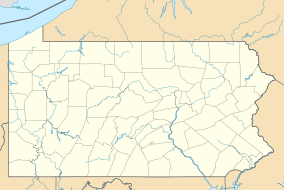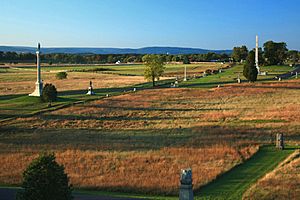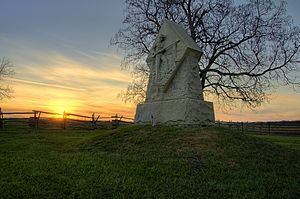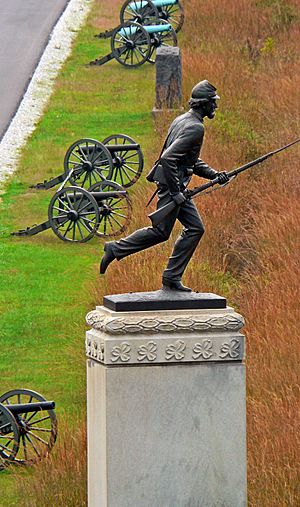Gettysburg National Military Park facts for kids
Quick facts for kids Gettysburg National Military ParkGettysburg National Park (1893) Gettysburg Park |
|
|---|---|
|
IUCN Category III (Natural Monument)
|
|
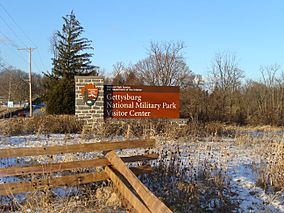
The 2008 sign for the PA 134 (west) Visitor Center entrance is a National Park Service rustic structure built to appear as if the base wall and column are of Gettysburg Granite, a locally-quarried material in structures during the Battle of Gettysburg.
|
|
| Nearest city | Gettysburg, Pennsylvania |
| Area | 3,965 acres (16.05 km2) (as of 2009) 1963: 2,871 acres 1932: 2,530 acres 1916: ~2,302 acres 1900: 1,221 acres 1888: 540 acres |
| Established | 1966: added to NRHP 1895: national park designation 1893: federal protection 1864: GBMA protection 1863: initial protection |
| Visitors | 1,031,554 (in 2010) |
| Governing body | 1933: National Park Service 1896: War Department 1864: Gettysburg Battlefield Memorial Association |
| Website | Gettysburg National Military Park |
|
Gettysburg National Military Park
|
|
| Architect | Emmor Bradley Cope; William Saunders |
|---|---|
| NRHP reference No. | 66000642 |
| Added to NRHP | October 15, 1966 |
The Gettysburg National Military Park is a special place that protects the land where the famous Battle of Gettysburg happened in 1863. This battle was a very important part of the American Civil War. The park is located in Gettysburg, Pennsylvania.
The National Park Service takes care of the park today. It includes most of the actual battlefield. It also has areas that were important during the battle, like places where soldiers rested or where hospitals were set up. The park also protects the Gettysburg National Cemetery.
Many of the park's 43,000 items from the Civil War are on display. You can see them at the Gettysburg Museum and Visitor Center.
The park has more trees now than it did in 1863. The National Park Service is working to make parts of the battlefield look like they did during the battle. This means removing some trees and replanting old orchards. They also plant native plants along roads to help local wildlife.
The park was added to the National Register of Historic Places on October 15, 1966. This means it is a historically important site.
Contents
Protecting the Battlefield Land
After the battle, people wanted to protect the land. In 1864, the Gettysburg Battlefield Memorial Association started buying land. They wanted to create memorials and preserve the battlefield.
Later, the United States government began buying land for the park. This started on June 7, 1893. The park officially became a national park on February 11, 1895. A law was passed to transfer the land to the Secretary of War.
Today, the Gettysburg Foundation helps the park. It is a non-profit group that works with the National Park Service. The Foundation helps raise money to protect the park. For example, they helped build the new Museum and Visitor Center in 2008. They also help care for the nearly 400 cannons on the battlefield.
In 2009, the David Wills House became part of the park. This is where President Lincoln finished writing his famous Gettysburg Address. The Gettysburg Foundation also operates this historic house.
Remembering the Past
Gettysburg National Military Park is a very important place for remembering history. Many memorials are located here.
On November 19, 1963, a special event was held at Gettysburg. It was 100 years after President Lincoln gave his Gettysburg Address. An actor named Raymond H. Massey played President Lincoln. He arrived by an old steam train and rode a horse to the National Cemetery. There, he gave Lincoln's famous speech.
Many people attended this event, including former President Dwight D. Eisenhower. He lived nearby. Thousands of photographers were there, and U.S. Air Force planes flew overhead. The parade followed the same path Lincoln took 100 years earlier.
Park Management
The Gettysburg National Military Park is managed as part of the National Park Service's Northeast region. Many different superintendents have led the park over the years. They work to protect the park and educate visitors.
Environmental Challenges
The park is very popular, with about 2 million visitors each year. This popularity can cause some problems for the environment.
- Pollution: Traffic from many visitors can cause pollution.
- Invasive Species: Plants and animals that are not native to the area can harm the park's natural environment.
The park works to manage these challenges. They want to keep the park healthy for future visitors and wildlife.
Images for kids
See also
 In Spanish: Parque Militar Nacional de Gettysburg para niños
In Spanish: Parque Militar Nacional de Gettysburg para niños
 | Chris Smalls |
 | Fred Hampton |
 | Ralph Abernathy |


